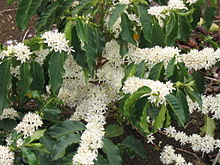Arabica coffee
| Coffea arabica | |
|---|---|
 |
|
| Coffee flowers | |
 |
|
| Coffee fruits | |
| Scientific classification | |
| Kingdom: | Plantae |
| (unranked): | Angiosperms |
| (unranked): | Eudicots |
| (unranked): | Asterids |
| Order: | Gentianales |
| Family: | Rubiaceae |
| Subfamily: | Ixoroideae |
| Tribe: | Coffeeae |
| Genus: | Coffea |
| Species: | C. arabica |
| Binomial name | |
|
Coffea arabica L. |
|
Coffea arabica /əˈræbɪkə/ is a species of Coffea originally indigenous to the forests of the southwestern highlands of Ethiopia. It is also known as the "coffee shrub of Arabia", "mountain coffee", or "arabica coffee". C. arabica is believed to be the first species of coffee to be cultivated, and is by far the dominant cultivar, representing some 70% of global production. Coffee produced from the less acidic, more bitter, and more highly caffeinated robusta bean (C. canephora) makes up the preponderance of the balance.
Wild plants grow between 9 and 12 m (30 and 39 ft) tall, and have an open branching system; the leaves are opposite, simple elliptic-ovate to oblong, 6–12 cm (2.5–4.5 in) long and 4–8 cm (1.5–3 in) broad, glossy dark green. The flowers are white, 10–15 mm in diameter and grow in axillary clusters. The seeds are contained in a drupe (commonly called a "cherry") 10–15 mm in diameter, maturing bright red to purple and typically contains two seeds (the coffee seeds).
Endemic to the mountainous regions of Yemen and the southwestern highlands of Ethiopia, C. arabica is now rare in Ethiopia, while many populations appear to be of mixed native and planted trees. In Ethiopia, where it is called būna, it is commonly used as an understorey shrub. It has also been recovered from the Boma Plateau in South Sudan. C. arabica is also found on Mount Marsabit in northern Kenya, but it is unclear whether this is a truly native or naturalised occurrence. The species is widely naturalised in areas outside its native land, in many parts of Africa, Latin America, Southeast Asia, China, and assorted islands in the Caribbean and in the Pacific.
...
Wikipedia
